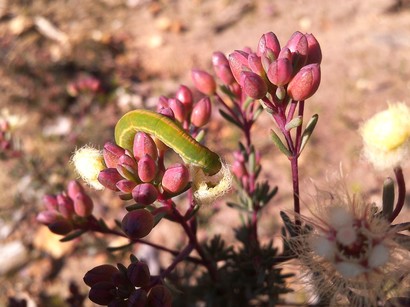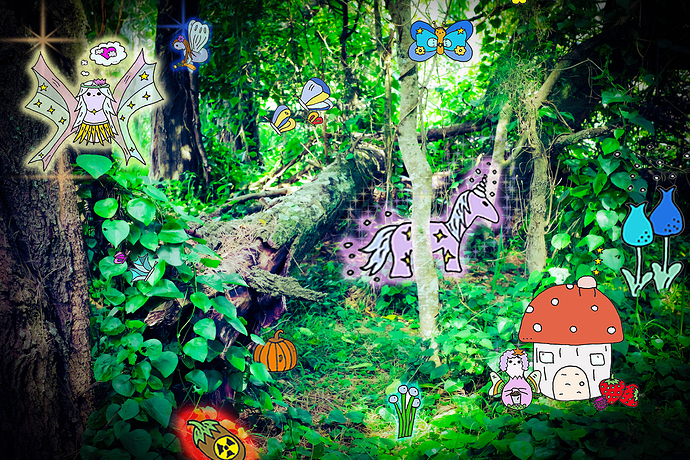That’s really cool! ![]()
That’s the doodle of Bhikkhuni Khema teaching king Pasenadi.
That’s really cool! ![]()
That’s the doodle of Bhikkhuni Khema teaching king Pasenadi.
Maybe the caterpillar there resembles this one?

I also took a video of it how it is eating from the flower… ![]()
I spent a lot of time with small little things while hanging around in the bush in Australia! ![]()
![]()
![]()
![]()
Dog on a leash
@amimettalove, here’s your doodle!
Bhikkhus, this saṃsara is without discoverable beginning. A first point is not discerned of beings roaming and wandering on hindered by ignorance and fettered by craving.
…
Suppose, bhikkhus, a dog tied up on a leash was bound to a strong post or pillar: it would just keep on running and revolving around that same post or pillar. So too, the uninstructed worldling … regards form as self … feeling as self … perception as self … volitional formations as self … consciousness as self…. He just keeps running and revolving around form, around feeling, around perception, around volitional formations, around consciousness. As he keeps on running and revolving around them, he is not freed from form, not freed from feeling, not freed from perception, not freed from volitional formations, not freed from consciousness. He is not freed from birth, aging, and death; not freed from sorrow, lamentation, pain, displeasure, and despair; not freed from suffering, I say.
But the instructed noble disciple … does not regard form as self … nor feeling as self … nor perception as self … nor volitional formations as self … nor consciousness as self…. He no longer keeps running and revolving around form, around feeling, around perception, around volitional formations, around consciousness. As he no longer keeps running and revolving around them, he is freed from form, freed from feeling, freed from perception, freed from volitional formations, freed from consciousness. He is freed from birth, aging, and death; freed from sorrow, lamentation, pain, displeasure, and despair; freed from suffering, I say.
I was thinking that you could give an alternative title for the “public face” pic:
“how to get approval for Bhikkhuni ordination”
Dear Venerable Yodha, apologies for my tardiness in responding to the Rohitassa doodle.  Thank you
Thank you 
I was so pleased to come back online and amongst the messiness of being a moderator see you lovely work.
so.much.dukkha 
‘freedom is freedom to give expression to desire’ -not Yoda. 
with metta,
Decline of the true Dhamma flowchart
Again, in the future there will be [Buddhists] who are undeveloped in body, virtuous behavior, mind, and wisdom. When those discourses spoken by the Tathāgata are being recited that are deep, deep in meaning, world-transcending, connected with emptiness, they will not want to listen to them, will not lend an ear to them, or apply their minds to understand them; they will not think those teachings should be studied and learned.
But when those discourses are being recited that are mere poetry composed by poets, beautiful in words and phrases, created by outsiders, spoken by disciples, they will want to listen to them, lend an ear to them, and apply their minds to understand them; they will think those teachings should be studied and learned.
Drinking deep the Dhamma
Dhp 79
S/He who drinks deep the Dhamma lives happily with a tranquil mind. The wise wo/man ever delights in the Dhamma made known by the Noble One (the Buddha)
Ohhh, lovely, another of my favorites 
It will be sad when the Dhamma is so trivialised that:
But when those discourses are being recited that are mere poetry composed by poets, beautiful in words and phrases, created by outsiders, spoken by disciples, they will want to listen to them, lend an ear to them, and apply their minds to understand them; they will think those teachings should be studied and learned. AN5.79
With metta
I confess. I’m guilty of enjoying this thread to bits!
Thank you Ven @yodha.
Now, to go back to maintaining my appearance of equanimity.
Hmmm… I think that from the Buddha’s viewpoint that was “in the future”, but from our view that happened a long time in the past.
We are lucky to live in our little SuttaCentral bubble where people actually “think those (=the Buddha’s direct) teachings should be studied and learned”.
There is a natural selection as shown in the flowchart… The beautiful poetry survives and flourishes, the true dhamma is hard and challenging and dies out.
I wasn’t talking about SC- we see it being limited to poetic expressions only, elsewhere. I think even the Buddha used puns and played with the dhamma, but it wasn’t at the expense of neglecting the true practice. ![]()
with metta
The high tower of wisdom
Dhp 28
Just as one upon the summit of a mountain beholds the groundlings, even so when the wise wo/man casts away heedlessness by heedfulness and ascends the high tower of wisdom, this sorrowless sage beholds the sorrowing and foolish multitude.
Another project with @Aranya! 

The deva and the maluva-creeper pod
Bhikkhus, suppose that in the last month of the hot season a māluva-creeper pod burst open and a māluva-creeper seed fell at the foot of a sāla tree. Then a deity living in that tree became fearful, perturbed, and frightened; but the deity’s friends and companions, kinsmen and relatives—garden deities, park deities, tree deities, and deities inhabiting medicinal herbs, grass, and forest-monarch trees—gathered together and reassured that deity thus: ‘Have no fear, sir, have no fear. Perhaps a peacock will swallow the māluva-creeper seed or a wild animal will eat it or a forest fire will burn it or woodsmen will carry it off or white ants will devour it or it may not even be fertile.’ But no peacock swallowed that seed, no wild animal ate it, no forest fire burned it, no woodsmen carried it off, no white ants devoured it, and it was in fact fertile. Then, being moistened by rain from a rain-bearing cloud, the seed in due course sprouted and the māluva creeper’s tender soft downy tendril wound itself around that sāla tree. Then the deity living in the sāla tree thought: ‘What future fear did my friends and companions, kinsmen and relatives…see in that māluva-creeper seed when they gathered together and reassured me as they did? Pleasant is the touch of this māluva creeper’s tender soft downy tendril!’ Then the creeper enfolded the sāla tree, made a canopy over it, draped a curtain all around it, and split the main branches of the tree. The deity who lived in the tree then realised: ‘This is the future fear they saw in that māluva-creeper seed. Because of that māluva-creeper seed I am now feeling painful, racking, piercing feelings.’
“So too, bhikkhus, there are certain recluses and brahmins whose doctrine and view is this: ‘There is no harm in sensual pleasures. ’…They say thus: ‘This is the future fear those good recluses and brahmins saw in sensual pleasures…that we are now feeling painful, racking, piercing feelings.’ This is called the way of undertaking things that is pleasant now and ripens in the future as pain.

Ending suffering:
Approach one: take suffering and do something nice to suffer less. Simile: getting from A to B- take the nice car instead of the stuffy bus
Approach two: find out the cause of suffering and remove it: Simile: Surgey is required where a plaster wont be enough.